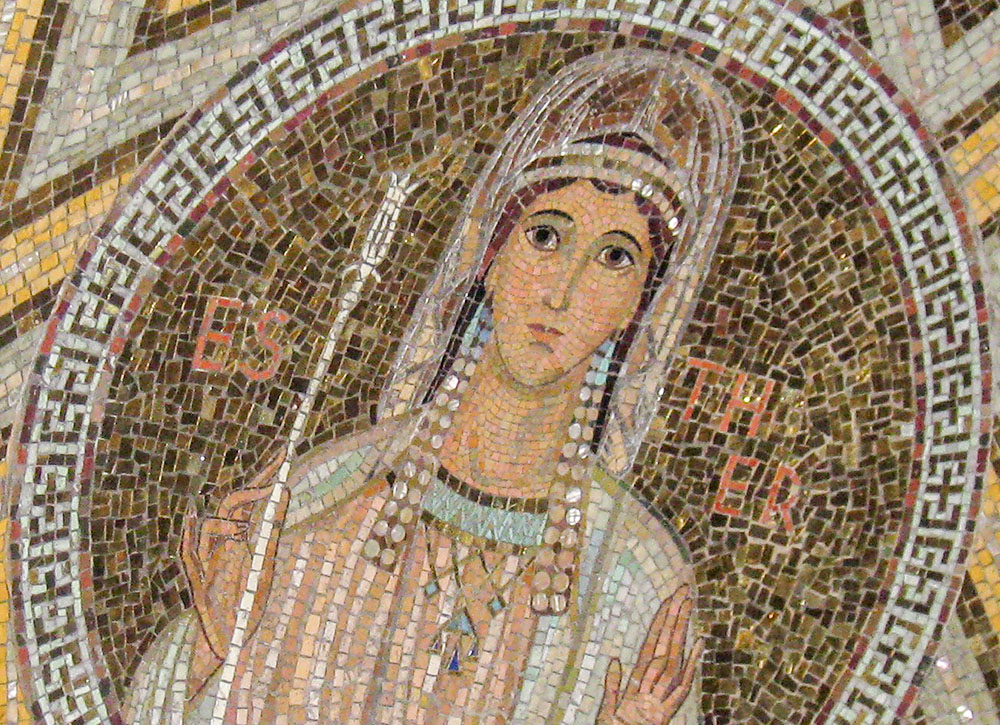
A mosaic depicts the biblical figure Esther in the Dormition Church on Mount Zion in Jerusalem. (Wikimedia Commons/Deror avi)
Two months ago, I decided to give away a pair of slippers that I liked very much but could not use due to some problem. They had been with me for two years. From the moment I decided to give them away, I began to feel something positive within me. There was, I felt, some free, empty space being created within me. It was like some unwanted elements plucked out or some knots being loosened, giving space for something precious to dwell in its place.
The experience brought me much joy and comfort. I could feel springs of blessing welling up within me. I could simply rejoice even with those who had downgraded me, in the face of sarcastic remarks from others, or when facing difficult moments in community living. I could now approach those so-called difficult people with much ease.
Within me, there was a spring of joy. God had indeed occupied that little space without my knowledge.
In the Gospel, we read, "When an unclean spirit has gone out of a person, it wanders through waterless regions looking for a resting place, but it finds none. Then it says, 'I will return to my house from which I came.' When it comes, it finds it empty, swept and put in order. 'Then it goes and brings along seven other spirits more evil than itself" (Matthew 12:43-45). Jesus is exhorting us to fill our empty spaces in our lives with him.
When we create a space for God, he enters and dwells there. For some days, I have been reading the Book of Esther. Before that, I read the Book of Judith.The space both of these women made for the God of Israel brought forth wonders in the life of the chosen ones of God. The people were saved. They made space for God through prayer and fasting. They emptied themselves of self-glory and everything related to it.
Yes, when I empty myself of my human desires and achievements, my jealousy and anger, I am making a little space for God to enter my life and capture every fiber of my being.
When I was a young professed, I was away from our community on our outreach mission in a distant place with a senior sister. One morning, as we were getting ready to leave for the mission, she said, "It is my best friend's birthday today. I do not have a card to send her."
Advertisement
I could feel the disappointment in her voice. We could not imagine buying a card as there were no shops in the vicinity. In those days, calling by phone was a distant dream.
I had carried a beautiful birthday card, very dear to my heart, particularly reserved to send to my best friend. There was a war within me as I contemplated her need of the moment. I parted with the card, which brought a smile of joy to my companion.
I cannot remember if God had entered into that little space of "giving-up" in the early years of my religious life. Certainly, it had hurt me. I had heard in the novitiate that giving hurts. It had now become a reality.
Reading the Book of Esther, I understood that to save the life of her Jewish community, Esther chose to pray and fast with her people and take a risk. She had to give up her comfort for a while. She created an empty space for God to enter, dwell and transform her into his channel of life.
"Go gather all the Jews to be found in Susa, and hold a fast on my behalf, and neither eat or drink for three days, night or day. I and my maids also fast as you do. After that I will go to the king, though it is against the law; and if I perish, I perish" (4:16-17).
She prayed, "O my Lord, you only are our king; help me, who am alone and have no helper but you. ... Remember, O Lord; make yourself known in this time of affliction, and give me courage, O King of the gods and Master of all dominion! Put eloquent speech in my mouth before the lion ... Save us by your grace" (Esther C:14, 23-25).
In the life of Judith (9:1-ff, 12: 6-9), we see the brave decision she took with fasting and prayer. She believed the faithful God of her life would come to save her people from the clutches of Holofernes.
Was she herself becoming a sacrificial lamb? God would decide. The emptiness she created by prayer made a space to bring about miraculous results through her.
We understand that emptiness is necessary to begin anew, to welcome the newness, to welcome new life.
In her spiritual classic The Reed of God, Caryl Houselander describes the emptiness of the Blessed Mother as "emptiness like the hollow in the reed, the narrow riftless emptiness, which can have only one destiny: to receive the piper's breath and to utter that is in his heart. It is emptiness like the hollow of the cup, shaped to receive the water or wine. It is like that of the bird's nest, built in a round warm ring to receive the little bird."
We understand, then, that emptiness is necessary to begin anew, to welcome the newness, to welcome new life.
Did the 12 apostles also create emptiness within them when the Master called them from their diverse backgrounds, from their varied occupations?
After the first surprise of being called, they totally believed in Jesus. They thought, "If he is calling us to do a job, then he will help us to accomplish it." Trust filled their humble, empty hearts. It is the kind of faith every one of us need when we are called to a mission we feel unqualified or unworthy to carry out.
The disciples, Judith and Esther had this kind of faith when they realized they were called to a mission. Their hearts were empty for God to dwell and act. They reached this point through fasting and prayer.
It is the kind of faith God is calling us to when entrusting us with a particular mission. It is the kind of faith that God will equip us to do in spite of our unworthiness. We see what we lack, but God sees all our gifts and abilities. Once we accept his call, he might pour more gifts upon us. It is the kind of faith that will bear fruit even when we see nothing clear before our eyes. We may not even see the fruits immediately or for a long time.
Is God calling us today to a particular mission? It can be near or far. Our mission may be in our own families; it may be in our neighborhood to spend time with an elderly couple or in an orphanage; it may be to guide a youth group in the use of digital media.
All that we need when being called is an empty and humbled heart that will be filled with faith and hope by the one who calls us. Let us give ourselves away — our selfish desires, treasures and occupations — and empty ourselves, allowing God to enter, and we will become his channel of blessings.





